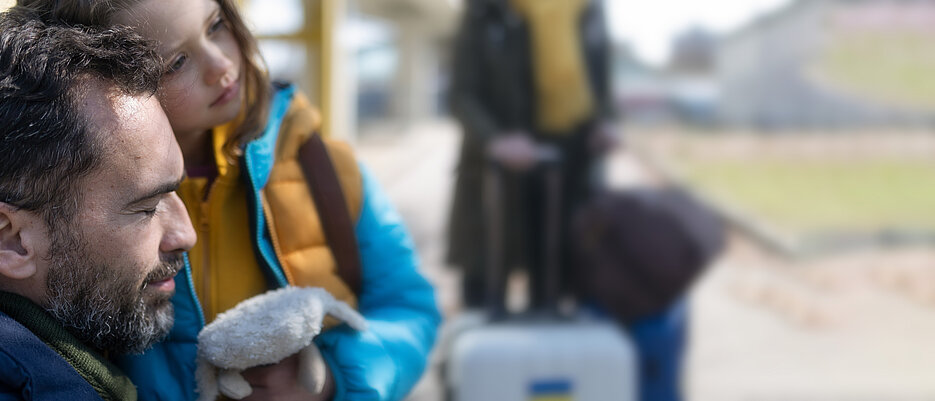Voices From the War: What Tweets Reveal About Refugee Experience
09/07/2023What is on the minds of people fleeing the war in Ukraine? An interdisciplinary study by the University of Würzburg provides new perspectives. It will be presented at a public conference on 26 September.

What are the worries and fears of people fleeing war zones in Ukraine? What do they talk about in social networks? And: What issues are they dealing with after they have fled? The chairs of English Linguistics and Global Urbanisation and Remote Sensing at the University of Würzburg (JMU) have now worked on a new study about this. Researchers led by Prof. Carolin Biewer and Prof. Hannes Taubenböck evaluated tweets from refugees and analysed them in terms of content, time and place of origin. This enabled them to determine the phase of the war in which postings were made and whether their authors were still in Ukraine or already in other countries.
The result is an overview of different thematic clusters that show what migrants are concerned about at different times during their flight. "We can use it to illustrate how the war affects people's lives in very concrete ways," explains Hannes Taubenböck. "Twitter users from war zones, for example, post mainly about humanitarian aid, nuclear threats, military attacks and war journalism. After leaving the country, they most often discuss food, transport, finance and art," adds project researcher Dr. Richard Lemoine Rodríguez.
Study Sheds Light on Refugee Events from New Perspectives
Researchers from linguistics, geography, remote sensing and computer science worked together to evaluate the study. Their goal: to offer a personal insight into the consequences of war in order to better understand the needs of refugees. This information will help complement official sources by incorporating migrants' first-hand, real-time perspectives.
"Our results show that combining spatial and linguistic data to analyse social media information is promising," Carolin Biewer underlines. "This gives us information about the challenges people face when fleeing." In a next step, the researchers want to analyse the Twitter data even more deeply linguistically in order to identify and categorise not only topics but also emotions and opinions of refugees.
Presentation of the Study With a Personal Account by a Refugee
The study will be presented on 26 September 2023 at the Centre for Philology and Digitality (ZPD) as part of the workshop "Geolingual Studies - A New Research Direction". The conference will be opened by University President Prof. Paul Pauli at 2 pm. After a keynote by Dr Philipp Rode from the London School of Economics on processes of global urbanisation, there will be a session from 4:30 pm on "Migration and Mobility" with contributions on migration in West Africa and Ukraine.
From 5:30 pm, the Ukraine study will be presented. Kyryl Hrinchenko, a Ukrainian refugee, will also be present and will talk about his own refugee experience. He and his wife fled Kharkiv with their daughter at the beginning of the war. "Kyryl's lecture helps to reflect our scientific findings with a real-life account of experience," says Hannes Taubenböck. "This makes it particularly clear once again what a flight means for families."
The lecture will be held in English. Participation is free of charge. Interested parties are asked to register - by email to geolingualstudies@uni-wuerzburg.de. The study was funded by the Momentum Programme of the Volkswagen Foundation.
Chair for Global Urbanisation and Remote Sensing
The Chair of Global Urbanisation and Remote Sensing is a cooperation chair with the German Aerospace Center (DLR) based on the Jülich model. This constellation enables synergistic research between the university and the large-scale research centre. Head of the Chair, Professor Hannes Taubenböck, is also head of the "Geo Risks and Civil Security" department at the German Remote Sensing Data Center (DFD) of the DLR.
Chair of English Linguistics
The Chair of English Linguistics represents in research and teaching, among others, the fields of World Englishes, sociolinguistics, urban linguistics and digital linguistics - in addition, it strives for close cooperation with geographical remote sensing, computer philology and computer science. The goal is joint research into the connection between language and space. This new orientation is funded by the Volkswagen Foundation within the framework of the Momentum Programme.
Further Information on the Event
The lectures on Ukraine will take place on 26 September at 5:30 pm at the Centre for Philology and Digitality (ZPD) at Emil-Hilb-Weg 23 in 97074 Würzburg.
Further information on the programme can be found here:
Contact
Prof. Dr. Carolin Biewer, Chair of the Department of English Linguistics, Phone: +49 931 31-80224, Mail: carolin.biewer@uni-wuerzburg.de.
Prof. Dr. Hannes Taubenböck, Chair of the Department of Global Urbanisation and Remote Sensing, Phone: +49 8153 28-2480, Mail: hannes.taubenboeck@dlr.de.






